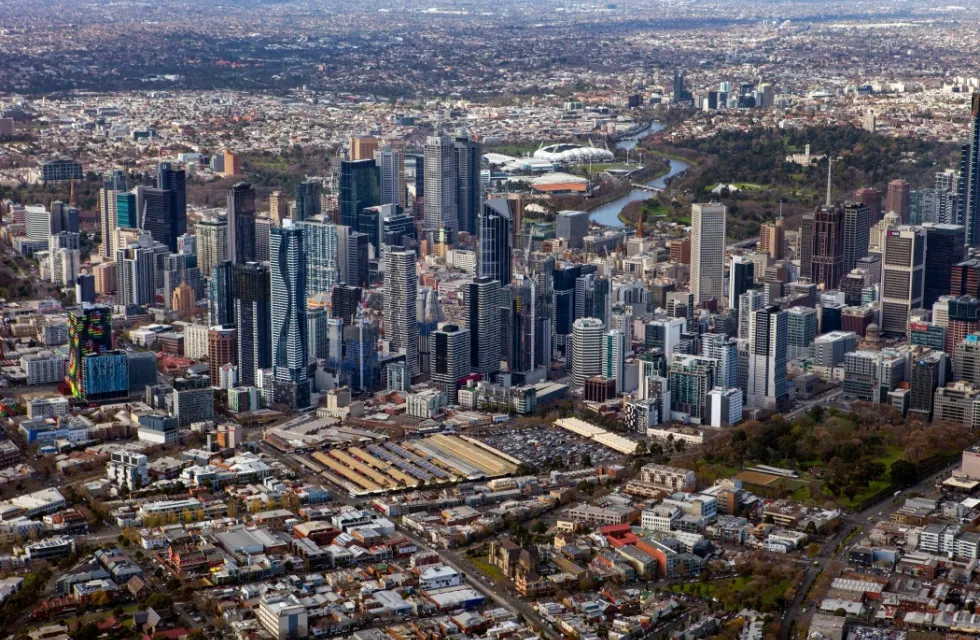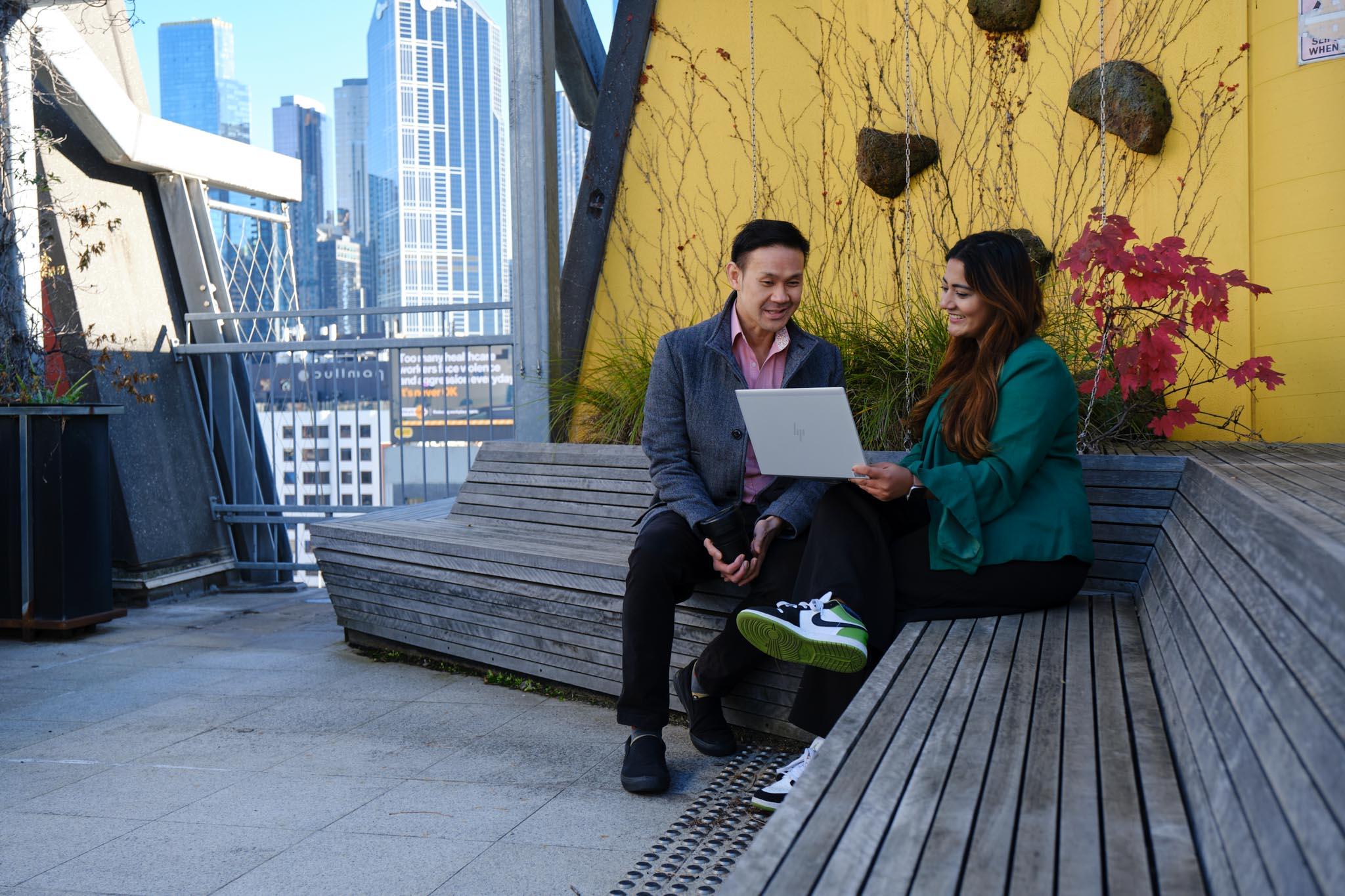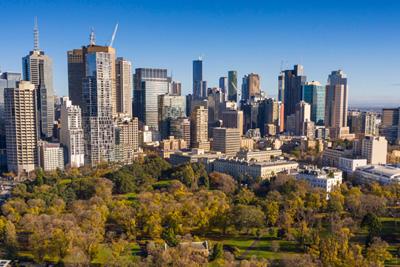There are many ways to reduce the impact of your business on the planet and our community. Let’s get started.
Reduce the impact of your business

The first step in being more sustainable is selecting an environmentally conscious site to run your business from.
Whether you want to own the building or rent out some space, here are some questions you can ask real estate managers to help inform your choice. The more questions answered with a yes, the more sustainable your building is. Importantly, where energy and water efficiency is concerned, you can also save a lot of money on your utility bills!
Download the checklist below:

Energy used to power businesses typically comes from electricity or gas. Most of the world still sources its energy from fossil fuels, which are a major contributor to global warming.
Renewable energy is energy that is collected from renewable resources, which are naturally replenished on a human timescale, such as sunlight, wind, rain, tides, waves, and geothermal heat. Non-renewable energy sources, such as the fossil fuel ‘coal’, are finite and will run out at some point.
There are an increasing number of energy retailers specialising in renewable energy. They also have tools to help you track and reduce your energy consumption. Check out the Green Electricity GuideOpens in new tab.
It is important that we all take simple steps to reduce our energy use where we can and shift away from fossil fuels, to support the inevitable shift to renewable sources.
Did you know?
In 2016, renewable energy provided about 16 percent of Victoria’s electricity. Other Australian states are far ahead. For example, in the same year renewable energy provided about 48 percent of South Australia’s electricity.
Source: Environment VictoriaOpens in new tab
Top five tips
- Switch off appliances when not in use.
- Set your thermostat to between 24 and 26 degrees for cooling in summer and between 18 and 20 degrees for heating in winter.
- Choose energy efficient alternativesOpens in new tab when purchasing or leasing new equipment and appliances (anything that uses energy!).
- Minimise temperature leakages via good draught seals, insulation and keeping your doors closed.
- Run your business on renewablesOpens in new tab.
To help you plan for your event's energy efficiency, download the template below.

Water is used by businesses in many different ways – from hydration to sanitation – and it is one of our most precious resources.
Think about where your water is sourced and what ends up in wastewater. How we use water can also impact the amount of energy we use.
Did you know?
The energy required to produce and transport plastic water bottles could fuel an estimated 1.5 million cars for a year, yet approximately 75% of water bottles are not recycled - they end up in landfills, litter roadsides, and pollute waterways and oceans. They also 450 years to break down.
Source: WWF, 2023Opens in new tab
It is important that we all take action to reduce the amount of water used and to ensure there are no nasties going down the drain.
Top five tips
- Check that you don't have any leaking taps or appliances.
- Provide drinking fountains so people don't need to buy bottled water. Check out where drinking fountains are located across the City of MelbourneOpens in new tab.
- Choose water efficient appliances and fixtures when purchasing or leasing water related equipment and appliances.
- Install a rainwater tank and grey water collection system for use on your garden (if you have one) or toilet flushing.
- Make sure chemicals and oil are responsibly thrown away and not just poured down drains.
You could also:
- Provide staff with reusable water bottles (or ask them to bring their own) and provide or sell reusable bottles or cups to your customers.
To help you plan for your event's energy efficiency, download the template below.

Businesses require purchasing decisions to be made.
Once you have made the decision you need to buy something, think about where it has come from, what it is made of and what will happen to it after you use or sell it – is it reusable or recyclable?
Your purchasing power can be used to engage with suppliers and question your supply chain.
Did you know?
Plastic bags don't go away; they just break into smaller and smaller pieces of plastic, taking between 15 and 1,000 years to break down into the environment.
Source: Keep Australia Beautiful, 2023Opens in new tab
Purchasing from local, certified and ethical companies is one of the easiest ways to reduce your environmental footprint and that of your customers.
Top five tips
- Purchase items that are made out of recycled material, are recyclable, reusable or have a guarantee that they are made to last.
- Purchase locally made products (low carbon miles).
- Avoid products with excessive packaging or buy in bulk (for example, swap single-serve packaged products with loose or bulk packaged items).
- Purchase products with an environmental or social certification, such as Forest Stewardship Council (FSC), fair trade or carbon neutral.
- Support sharing goods and services (hiring or leasing), rather than buying.
You could also:
- Check the companies you purchase from have a clear understanding of their supply chain – where things come from and how they are made, including awareness of key environmental and social risks their products may be contributing to.
- Provide staff with reusable bottles (or ask them to bring their own) and provide or sell reusable bottles or cups to your customers.
- Reward customers for bringing their reusable cups, bags and bottles with discounts or opportunities to enter competitions via social media.
- Add extra cost to single use items to encourage reusable items. For example, make coffees or alcoholic beverages 50 cents extra in takeaway cups.
- Prioritise catering that uses fair trade, local, seasonal, carbon neutral and any other sustainable food options.
- Engage a social enterprise to do your catering.
To help you plan for your responsible purchasing for your business, download the template below.

Many businesses sell food and beverages in one form or another. It might be as simple as selling pre-packed bottled drinks or you might be a cafe or restaurant. Food and beverage choices contribute a significant part of anyone’s environmental impact.
1 in 6 Australian adults haven't had enough to eat in the last year, including 1.2 million children (Source: Food BankOpens in new tab)
Making some small changes to the way you cater at your event can have a big impact on the environment and the people in our community.
Did you know?
In Australia, 7.6million tonnes of food is lost or wasted each year., 70% of which is perfect edible. One in five bags of groceries, equal to around 312kg per person, is thrown away each year.
Source: Foodbank, 2023Opens in new tab
Top five tips
- Provide staff with reusable bottles (or ask them to bring their own) and provide or sell reusable bottles or cups to your customers.
- Provide at least 50 per cent vegetarian and vegan options, and where possible choose chicken instead of beef to cut down on carbon emissions.
- Ask caterers to avoid single use waste products or products with excessive packaging (for example, swap single-serve sauce packets for a condiment station).
- Prioritise catering that uses fair trade, local, seasonal, carbon neutral and any other sustainable food options.
- Engage a social enterprise to supply products, staff or to do your catering.
You could also:
- Provide drinking fountains or water stations so people don’t need to buy bottled water. Check out where drinking fountains are located across the City of Melbourne.
- Provide recycling and organic waste collection bins.
- Reward customers for bringing their reusable cups, bags and bottles with discounts or opportunities to enter competitions via social media.
- Add extra cost to single use items to encourage reusable items. For example, make coffees and alcoholic beverages 50 cents extra in takeaway cups.
- Partner with an organisation that collects leftover food and redistributes it to people in need, or compost / send your food waste to a worm farm.
To help you plan for your responsible catering at your business, download the template below.
Social enterprise caterers that service the City of Melbourne
The information in this document is simply intended as a useful compilation of social enterprise caterers. The City of Melbourne has not reviewed, and does not endorse, a particular catering company over another.
Please also note that the information contained in this document was corrected at the time of publication (May 2023) but bear in mind that some information will have changed at the time of reading and it’s important that you confirm the information in this guide with the agencies directly.
Organisation | Contact details | About us |
|---|---|---|
Asylum Seeker Resource Centre are a not-for-profit social enterprise. Their food reflects the rich and diverse cultures of the asylum seeker members, which is expressed in the modern interpretations of classic flavours from Africa, the Middle East and Asia. | ||
Jarrah Catering is a corporate catering venture and Aboriginal business built on a shared commitment to Indigenous business development, and career development and advancement, including key community engagements and initiatives across Victoria. Their love of corporate catering comes from a long-held connection to country and shared passion for the hospitality industry. | ||
Free to feed is a social enterprise creating empowering employment opportunities for people seeking asylum & refugees through the creation of shared food experiences. From individual team lunch boxes to shared options made up of mains, salads, sides + mezze, Free to Feed have a catering solution for you. | ||
Mabu Mabu | Indigenous Catering - Contact usOpens in new tab | Mabu Mabu is an Indigenous owned food business on a mission to make native ingredients the hero of the Australian kitchen. Their food culture is all about sharing and celebrating Australian native ingredients. Their catering menu includes a range of morning and afternoon tea options, lunchbox, sharing and grazing options, and canapes. | |
Meals with Impact (MWI) is a work integrated social enterprise (WISE) that produces nutritious, culturally diverse meals for communities facing food insecurity. They employ women from migrant and refugee backgrounds who experience systemic barriers to employment, to co-design and cook meals for the communities they know well. Meals with Impact offers an array of services that include corporate packages including morning tea, lunch and afternoon, culturally diverse packaged meals, cocktail menus and sit down dining experiences with all proceeds going towards supporting women from migrant and refugee backgrounds access reasonable and sustainable employment. | ||
| Pawa Catering is an Aboriginal business specialising in Indigenous fusion food. They have made it their mission to showcase the incredible, flavours of native ingredients, and provide a sustainable and environmentally-friendly product and place of employment for Aboriginal communities. Pawa’s catering services include morning tea, afternoon snacks, platters, hot lunches, and an extensive canapé menu. Pawa has you covered. | |
| STREAT is a food systems social enterprise comprising of 12 hospitality businesses and a horticulture training social enterprise. STREAT supports and trains Victoria's most vulnerable young people in both hospitality and horticulture and provides social procurement in catering, cafe's, coffee and corporate gifts. From corporate catering options including breakfasts, lunches and treats in between, to formal event catering packages, STREAT’s chefs will ensure your catering hits the spot. | |
With a focus on employment and training for the long-term unemployed living with a mental illness, The Mission Caters is a social enterprise that aims to challenge stigma and discrimination in order to develop social bridges that create social inclusion in the community. The Mission Caters provides a range of contemporary Melbourne cuisine from breakfast grazing to full catering selections. | ||
Waverley Industries is a work integrated social enterprise that bring joy, independence and wellbeing to people with a disability by providing inclusive and meaningful employment in a supported work environment. Waverley Industries’ Catering program has built a reputation for fresh, delicious & consistent quality delivered catering across our diverse & loyal customer base. |

Recycling symbol of three arrows forming a triangleWaste is a big part of any business and typically comes from fit-out construction, promotional materials, food and packaging.
Organise your business to minimise the waste you create by thinking about what you buy and where it will go. Work with your suppliers to minimise waste before it gets to your business, as you run your business and after it goes to your customer.
Packaging is a real problem area and ultimately something you pay for – in the products you buy and sell. Reducing packaging is good for the environment and your hip pocket, so consider whether it's actually needed. For example, encouraging customers to bring their own coffee cup, means you won’t need to buy so many coffee cups and you will have less waste!
Did you know?
Australia generated 75.8 million tonnes of solid waste in 2018-19, which was a 10% increase over the previous two years.
Source: Australian Bureau of StatisticsOpens in new tab
You may need to rely on your staff and customers to put their waste in the right bin, so it helps to educate them with appropriate signage, and importantly – make it easy with good access to bins in the right places.
Top five tips
- Provide recycling bins (for example, mixed, IT, mobile phones) and organic waste collection bins.
- Avoid single use waste as much as possible. If you can’t reuse it, refuse it.
- Straws
- Plastic water bottles
- Plastic bags, cutlery and packaging
- Any merchandise and giveaways that won’t be used ongoing.
- Reward customers and staff for bringing their reusable cups, bags and bottles with discounts or opportunities to enter competitions via social media.
- Add extra cost to single use items to encourage reusable items. For example, make coffees and alcoholic beverages 50 cents extra in takeaway cups.
- Partner with an organisation that collects leftover food, old IT equipment and furniture; and redistributes these items to people in need.
You could also:
- Purchase items that are made out of recycled material, are recyclable, reusable or have a guarantee they are made to last.
- Avoid products with excessive packaging or buy in bulk (for example, swap single-serve packaged products with loose or bulk packaged items).
- Purchase products with an environmental or social certification (such as Forest Stewardship Council (FSC), fair trade or carbon neutral).
- Support sharing goods and services (hiring or leasing), rather than buying.
- Provide staff with reusable bottles (or ask them to bring their own) and provide or sell reusable bottles or cups to your customers.
- Ask caterers to avoid single use waste products or products with excessive packaging (for example, swap single-serve sauce packets for a condiment station).
To help you plan for waste and resource recovery at your business, download the template below.

Most businesses need people to buy things from them and they have to get there somehow!
Encourage customers to take active transport. This includes walking, riding or catching public transport.
Aside from the health benefits of active transport, these options reduce greenhouse gas pollution, reduce congestion and can make getting from A to B less stressful.
It’s important to consider how you might encourage customers to take active transport. This could simply be done by choosing a retail outlet or office located near good public transport options and promoting how to get there.
Top five tips
- Provide information on walking and riding routes to your business.
- Offer incentives to your customers for walking, riding or car pooling. For example, create a social media competition with a prize attached to walking, riding or car-pooling.
- If you need to hire or lease cars for your business, consider an electric fleet.
- Buy carbon offsets for travel.
- Ensure there’s adequate infrastructure to support extra bikes in the area.
To help you plan for active transport at your business, download the template below.

Planning makes it easier to be more sustainable. Focus on the things that are achievable and you can do well. Don’t try to do everything at once.
Planning tips
- Determine your objectives (what you want to achieve).
- Establish a baseline (what your current impact is).
- Set targets (where you want to get to).
- Brainstorm actions (to get you there).
- Make a plan (who, what, where and when).
- Put your plan into action.
- Check your progress and adjust actions (if needed) to achieve your target,
- Take any lessons on board for future planning and celebrate success!
Top tip: Don't try to do everything. Pick achievable and deliverable actions; save the rest for next year!
Statement of commitment
Make a statement of commitment – it helps get everyone on board and provides a clear message to the people you will be working with you as you run your business. View the statement of commitment example below.
Measurement and reporting your performance
Measuring your impacts helps you understand what your impacts are and enables you to identify opportunities for improvement, both environmentally and financially. Plus, quantifying your efforts helps you tell the story about all the awesome things you are doing.
Collating your data into a report helps provide the basis for your communications.
To help you plan, we’ve created a series of templates you can download below.
Download documents
Related pages
More information









